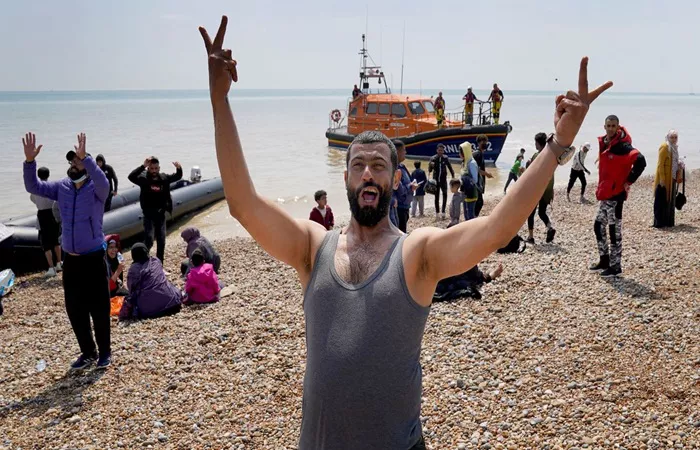LILLE — France is considering new measures to stop migrant boats headed for Britain while they are still in shallow coastal waters, a move that presents legal and safety challenges.
For years, France has served as a key departure point for migrants trying to cross the English Channel in search of a better life in the UK. Many of these migrants pay smugglers large sums to board overcrowded rubber dinghies, making a dangerous trip across one of the busiest maritime routes in the world.
French and British authorities have long pledged to crack down on the smuggling networks that organise these journeys. So far, French police have only acted on land to stop boats before departure. Once at sea, international maritime law allows French intervention only when human lives are in immediate danger.
To avoid police detection on land, smugglers have adapted. Instead of launching directly from the beach, they now “taxi” migrants by smaller vessels to boats waiting offshore. This method is harder to intercept and often more dangerous.
As more small boats land on UK shores, pressure is mounting on the British government—particularly from far-right parties—to act. In response, London has urged Paris to increase efforts to stop the crossings.
On Wednesday, France’s interior ministry told AFP it wanted to update its rules to allow police to stop “taxi boats” within 300 meters of the coast. An inter-ministerial committee has been tasked with developing a plan by this summer, and the French government hopes to present shared goals at a French-British summit between July 8 and 10 in England, which President Emmanuel Macron is expected to attend.
Earlier this year, Britain and France extended a border agreement under which the UK helps fund French patrol efforts. France’s new hardline Interior Minister Bruno Retailleau has called for a more aggressive approach, including boat interceptions at sea.
Despite these efforts, crossings continue to rise. On June 1 alone, a record 1,194 migrants arrived in the UK in small boats, according to AFP data from government sources.
A UK Home Office official said Wednesday that stronger cooperation with France was needed to build on the 10,000 crossing attempts already stopped this year.
Migrants, including families with children, have taken advantage of good weather to make the crossing. On Monday morning, AFP witnessed dozens of migrants, some from Eritrea, running across a northern French beach at sunrise as police fired teargas. Despite the chaos, many reached their inflatable boat—some carrying toddlers—by wading waist-deep into the sea.
In the past, police have also used knives to slash boats on land to prevent departures. This is partly why smugglers now prefer the offshore pickup method, even though it increases the danger for passengers.
So far this year, at least 17 people have died trying to cross the Channel. Last year saw a record 78 deaths. A French government report in February warned that the most dangerous stages are boarding or being forced to return to shore, which increase the risk of drowning or hypothermia.
Utopia 56, a migrant aid group, warned that stopping boats at sea could cause more boats to capsize and called the idea “brutal and dangerous.”
Thibaut Fleury Graff, an international law professor at Pantheon-Assas University, noted that any intervention in shallow waters must be legally justified. Under international law, people have the right to leave any country, he said. A state can only stop a vessel in its waters if there is a legal basis, such as a confirmed criminal act.
Graff added that the crime of human trafficking might apply, but enforcement should target smugglers—not the migrants themselves.
Related Topics
- Visa Overhaul, and Bali IFC” href=”https://www.popularmigrant.com/archives/16214″>Indonesia Plans Tax Reform, Golden Visa Overhaul, and Bali IFC
- Green Card Lottery 2025: Step-by-Step Guide to U.S. Residency
- Four Caribbean Nations Face US Scrutiny Over Citizenship-by-Investment Schemes


